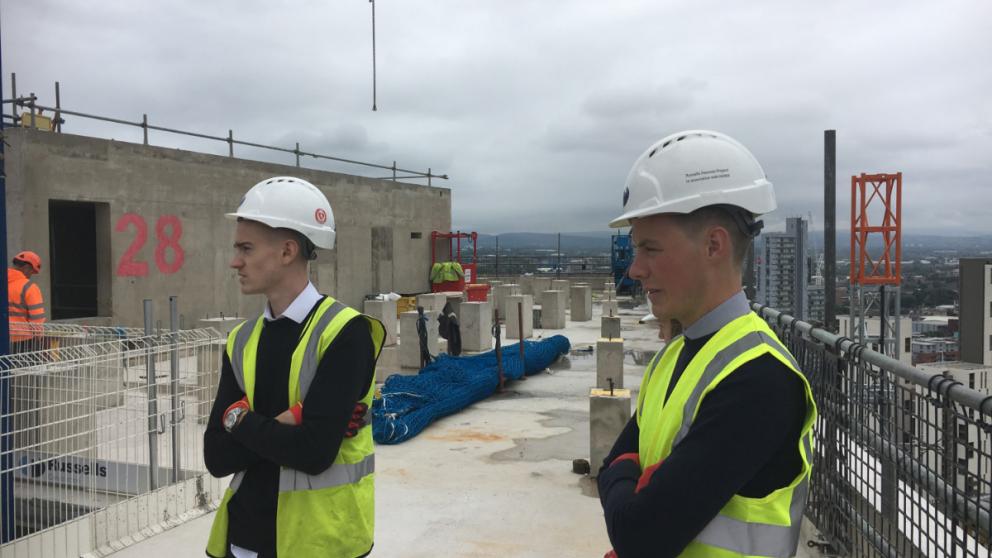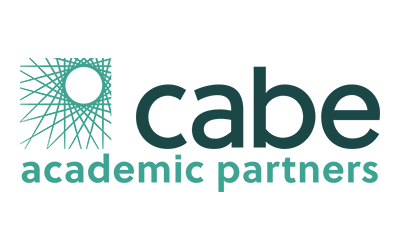
Building Surveying (Chartered Surveyor Degree Apprenticeship)
Part-time
Five year
September 2026
In a nutshell
Building Surveyors look at building pathology, focusing on refurbishment, reuse, development, restoration, repair, and conservation. With our Building Surveying degree course, you can develop a knowledge base and skill set that can lead to exciting global opportunities across many industries in the built environment sector.
Career-focused curriculum
Covering a broad range of key industry areas, the course curriculum explores a series of economic, legal, technical design and management modules. You’ll learn about the construction industry and its legal and regulatory framework and explore the relationship between a building and its internal and external environments. You’ll recognise how to diagnose problems with existing buildings and be aware of conservation and regeneration.
Accredited, engaging learning
We've shaped the learning experience so that you gain relevant knowledge, technical skills, and transferable career skills that are highly sought by industry. We're proud that our Building Surveying degree course is accredited by the Royal Institute of Chartered Surveyors (RICS) and Chartered Association of Building Engineers (CABE).
Incredible study location
We're excited to offer you a campus-based university experience minutes from buzzing central Manchester. Our location and industry connections give you great access to one of the UK's largest property and construction markets.
Salford ranks 8th on People & Planet's University League
People & Planet is the largest student network in the UK campaigning for social and environmental justice. They envision a future in which spiralling inequality, instability, climate crisis and resource depletion are reversed, and a world in which the balance of power in society has fundamentally shifted to an equal world that benefits all of us. University of Salford scored 71.0% and ranked 8th in the University League, with our highest scores in Managing Carbon, Staff and Student Engagement and Education for Sustainable Development.
Award-winning research you’ll learn from
University of Salford has won a prestigious Queen Elizabeth Prize for Education for its world-leading work in sustainable housing and energy efficiency. Through Energy House Labs, students benefit from teaching shaped by cutting-edge research that is helping to reduce energy costs, tackle fuel poverty and design low-carbon homes for the future.
The Queen Elizabeth Prizes for Education form part of the UK national honours system, recognising outstanding contributions by universities and colleges whose work delivers significant societal, economic and global benefit.
At an Open Day, you'll talk to Programme Leaders, tour our facilities and attend one-to-one sessions with our team who will be on hand to answer all of your questions.
You will:
- Build knowledge and skills to describe, explain, evaluate, and apply building construction techniques
- Learn to identify and use appropriate strategies and technologies applicable to building surveying practice
- Develop an understanding of the interactions between a building and its internal and external environments
- Gain the ability to identify symptoms and diagnose defects found in a diverse range of building types
- Understand urban regeneration so you can participate in future sustainable regeneration initiatives
This is for you if...
You have a passion for developing, advancing and shaping the future of the built environment
You're keen to develop technical and professional skills in a recognised role
You're interested in urban regeneration and building development, repair and restoration
All about the course
Course content
Delivered over five years, our BSc (Hons) Building Surveying Degree Apprenticeship course blends theoretical knowledge with applied professional skills and competencies.
During your studies, you will experience academic seminars and tutorials to build your knowledge. You will also experience project work with other built environment students, mirroring the collaborative approach of modern property and construction industries.
You will build your knowledge over progressive levels of study. The initial level four is designed to help you build a solid platform of knowledge that will then support your advanced studies at levels five and six.
Course content is delivered in modular 20-credit blocks to reach at total 360-credit BSc award. Modules are spread across five years of study.
How does a degree apprenticeship work?
The degree apprenticeship route will enable you to work and study for your degree. Your employer and/or the government will pay your tuition fees for your apprenticeship course.
There are two distinct components to the degree apprenticeship – the academic degree programme and the work-based assessment. The University – as lead provider – is responsible for delivering your degree programme. Your employer is responsible for delivering the work-based assessment components.
We will work with your employer to:
- Assure that knowledge you gain on the degree apprenticeship can be successfully applied in the workplace
- Ensure that you can evidence the standards and practices required to meet the professional competencies contained in the apprenticeship standard
We will create an annual programme timetable, which will include your lectures, seminars and tutorials. You will receive your timetable once you registered as a student.
As part of this course, you will work towards your Assessment of Professional Competence (APC) in order to be in a position to move onto the RICS Panel Exam following completion of the academic degree course. To do this, your employer must be able to support you – this is a requirement of the apprenticeship.
Introduction to Law and Regulatory Frameworks
You will be introduced to English law and relevant statutory requirements for studying for vocational qualifications in the construction and property professions. The module also introduces you to the workings of the English legal system, to the law relating to contracts and to the regulatory framework affecting the use, management and development of land, in particular, planning, building control and the CDM regulations.
Economics and Management
On successful completion of this module, you will be able to demonstrate knowledge of basic economic concepts and principles of the economic environment in which the construction and property industry operates and knowledge of management theories in the construction context. You will be able to discuss the key role of the construction industry in the economy, current economic issues and management challenges in the construction and property context.
Surveying Practice
This module covers the basic principles and computer software that you will need to understand to enter into a career in the property industry. You will become familiar with the Royal Institution of Chartered Surveyors and begin to understand what your preferred pathway into Chartership will be.
The module will also help to enhance your academic writing, and you will learn how to undertake referencing at degree level. You will also become conversant in the mandatory competency requirements of the RICS.
Building Construction and Defects
This module aims to provide you with the ability to understand how buildings are constructed and what defects are common given the method of construction. You will also understand how this affects the value of the property. Within this module, you will have the opportunity to develop building construction and pathology knowledge and develop the ability to undertake critical analysis, self-reflection and personal development.
Digital Design Practice
Digital Design Practice aims to develop a knowledge and understanding of the theory and practical application of using industry standard design software for design, measurement, specification, and the production of graphical representations of buildings.
Environmental Science and Services
Environmental Science and Services aims to develop a knowledge and understanding of the theoretical and design principles of how the structural elements of a building interact with the engineering services to provide a holistic product that provides a safe and sustainable environment with suitable levels of occupant comfort.
Sustainable & Energy Efficient Buildings
This module addresses the basic theory of sustainability within the context of the built environment and key principles of energy efficiency in construction. Throughout the module a range of cultural and intellectual factors including social, political, economic, and technical that shape the built environment are considered. The module fosters broad understanding of energy efficiency construction which takes net zero carbon policies and building physics principles into account.
Technology 2
You will enhance your knowledge and skills to describe, explain, evaluate, compare and apply building construction techniques and materials used in typical medium to large span single storey buildings and multi-storey industrial/commercial buildings. You will develop an understanding of both historic and contemporary construction techniques for medium to large buildings. You will learn to identify and critically review alternative construction technologies, and make informed decisions and recommendations.
Procurement and Administration
This module enables you to explore and differentiate the principal types of procurement systems and associated contracts used in the UK, you will also explore the fundamental procedures related to contract administration.
Building Surveying Design Studies
The module enables you to work on the building design process, creating practical design solutions and specifications for new and existing buildings, as well as the selection of appropriate materials and construction methods, considering functional, technical, aesthetical, economic, and sustainable feasibility. You will learn how to represent a building project graphically, and apply building design principles to produce building drawings using Computer Aided Design (CAD) techniques and schedules of work.
Property Law
This module further enhances your reporting and client advisory skills, allowing application of the main legal principles studied to a range of complex and in-depth problems. You will also learn to apply relevant case law relating to property for a variety of scenarios, such as trespass, nuisance, negligence, party wall matters and a variety of legal issues that often arise in property transactions. This module will help to enhance your professional report writing skills and capacity to act in an advisory manner. You will also address client care and diversity skills.
Development Appraisal and Viability
The purpose of this module is to provide you with a good working knowledge and understanding of the aims and objectives of delivering a property development scheme. You will be able to identify opportunities, undertake feasibility studies and development appraisals to ascertain the viability of a proposed project or site. You will be required to understand a variety of funding options and how to apply them dependent on your client’s needs.
Building Surveying Professional Practice
The Building Surveying Professional Practice module aims to further develop a knowledge and understanding of the theories and issues that might impact on the recently graduated surveyor as they move into practice and training roles. The module will seek to consider a range of contemporary areas of interest relating to surveying buildings under the prevailing legal requirements and statutory obligations as well as the professional and ethical codes of the professional bodies.
Building Surveying Project
You will work in a disciplinary team in the context of a complex refurbishment, design and construction project based environment. The project will highlight the working skills required by building surveyors and the real world/problem based scenario they face. The experience will help you to develop a personal development plan based on your learning needs, career aspirations or professional requirements e.g. RICS.
Building Maintenance and Retrofit
This module will explore retrofitting buildings to improve energy efficiency. Key retrofit solutions and underlying causes of potential risks will be investigated, and decision-making proves to avoid these risks will be demonstrated. The module addresses key building maintenance and construction management principles considering assessment methods and innovative technologies.
Conservation and Urban Regeneration
Conservation and Urban Regeneration aims to provide students with a fundamental knowledge and understanding of theories and issues relating to the fields of conservation of historic buildings and urban regeneration. The module will seek to consider a range of relevant contemporary areas including insight into relevant policy and regulatory requirements alongside the professional and ethical codes of professional bodies. Contemporary real world case studies will be studied alongside an overview of theory, policy and practice techniques where experienced practicing professionals will deliver guest lectures providing real world insight and a firm foundation for more advanced study and practice.
Building Pathology
The Building Pathology Module at Level 6 looks at the theory and practice of building pathology whilst exploring destructive and non-destructive methods of testing and how buildings are constructed in a modern setting and historical setting analysing materials on differing contexts and the use or misuse of deleterious materials.
Discipline Research Project
You will develop your knowledge of good research practice through the completion of a written research proposal and a research document. You will also develop data analysis skills through the collection and critical appraisal of different sources of data.
Please note that exact modules and content offered may vary in order to keep content current and, for courses that offer optional modules, may depend on the number of students selecting particular options. When accepting your offer of a place to study on a programme with optional modules, you should be aware that optional modules may not all run each year. Your tutor will be able to advise you as to the available options on or before the start of the programme. Whilst the University tries to ensure that you can undertake your preferred options, it cannot guarantee this.
School of Science, Engineering and Environment
Rising to the challenge of a changing world, our degree courses are designed to shape the next generation of urbanists, scientists, engineers and industry leaders.
Driven by industry and delivered by supportive programme teams, you can develop the knowledge and skills to become unstoppable in your career.
Facilities
Our carefully-designed study and seminar spaces provide an inspiring environment to develop ideas, work collaboratively and share best practice. Your independent learning is supported by a range of excellent facilities, including the library, the learning zone and computer laboratories.
Salford is also home to Energy House – the only fully climate-controlled research facility of its kind in the world. This full-sized, two-bedroom terraced house lives inside a sensor-packed environmental chamber that can replicate almost any weather conditions.
What you need to know
APPLICANT PROFILE
In addition to our academic entry requirements, we also look for certain characteristics in each student. Possessing these characteristics will not only help you to fulfil your potential at university, but it is also an essential requisite for a successful career in the built environment.
EMPLOYMENT REQUIREMENTS
To apply for a degree apprenticeship, you will need to be currently in full-time employment (minimum 30 hours a week), spending at least 50% of your time in England. If you are not in employment, you can search for employers participating in the degree apprenticeship scheme using the UK Government's national apprenticeship website.
DELIVERY
The programme is delivered on a part-time, day-release basis over a five-year period, subject to agreement by the employer and us.
ENGLISH LANGUAGE REQUIREMENTS
All of our courses are taught and assessed in English. If English is not your first language, you must meet our minimum English language entry requirements. An IELTS score of 6.0 (no element below 5.5) is proof of this, and we also accept a range of equivalent qualifications.
Please note: The entry criteria below are related to entry onto this course in the 2026/27 academic year.
GCSE
English Language and Mathematics at grade C/level 4 or above (or equivalent). You must fulfil our GCSE entry requirements as well as one of the requirements listed below.
If you do not hold level 2 Maths and/or English, please email the Apprenticeship Services Unit to discuss your options.
UCAS tariff points
104 points
GCE A level
BCC
BTEC National Diploma
National Diploma MMM
BTEC Higher National Diploma
Pass in a related subject for entry to level 5. Related subjects include Architecture, Construction, Civil Engineering, Building Studies, Estate Management
Foundation Degree
Pass in a related subject for entry to level 5. Related subjects include Architecture, Construction, Civil Engineering, Building Studies, Estate Management
Other Qualification
Degree in cognate subject for level 5 entry
Salford Alternative Entry Scheme (SAES)
We positively welcome applications from students who may not meet the stated entry criteria but who can demonstrate their ability to pursue the course successfully. Once we receive your application, we'll assess it and recommend it for SAES if you are an eligible candidate.
There are two different routes through the Salford Alternative Entry Scheme and applicants will be directed to the one appropriate for their course. Assessment will either be through a review of prior learning or through a formal test.
To be considered for the Salford Alternative Entry Scheme you must have already achieved or be working towards GCSE Maths and English Grade C/4 (or equivalent).
Please contact Admissions for further information.
How much?
The cost of the full degree apprenticeship programme is £27,000. The cost of the apprenticeship will be covered by your employer and/or the government. You will need to cover the cost of any study materials plus travel to and from campus if required.
Apprenticeship Funding
The apprenticeship levy was introduced in April 2017 and requires all employers operating in the UK, with a pay bill of over £3 million each year to invest in apprenticeships.
The funding policy supports the changes to the way apprenticeships in England are paid for, underpinned by the apprenticeship levy of 0.5% of the annual pay bill for companies paying over £3 million per year.
There is also a co-investment model for companies who will not be paying into the levy. The government will cover 95% of the cost of the apprenticeship and the employer will only have to contribute the remaining 5%. Once payments have been declared to HMRC, employers will now have access to a digital apprenticeship account from which they will be able to access funding to pay for apprenticeship training.
The maximum amount of money allocated to each standard falls into one of 15 funding bands, ranging from £1,500 to £27,000. The Chartered Surveyor standard has been allocated the following funding band:
Funding band: 15
Funding band maximum: £27,000
Find out more about Apprenticeship funding
Additional costs
You should also consider further costs which may include books, stationery, printing, binding and general subsistence on trips and visits.
All set? Let's apply
Not in Employment
To apply for an apprenticeship, you must first be employed with a company willing to enrol you on the apprenticeship programme.
The government national apprenticeship website has further information on this. The website also advertises vacancies for apprentices.
Unfortunately, the University does not hold details of employer vacancies.
In Employment
Speak with the apprentice lead in your organisation in the first instance as they will provide the funding and will make initial contact with the Apprenticeship Services Unit. Your employer will need to confirm that they'll fund and support your enrolment with the University.
If you are currently in employment with a company that is willing to support you through an apprenticeship, then they will need to contact us in the first instance to express their interest in the apprenticeship programme and this will trigger the application process.
For general apprenticeship enquiries email apprenticeships@salford.ac.uk phone: +44 (0)161 295 3063 or complete the contact us form




